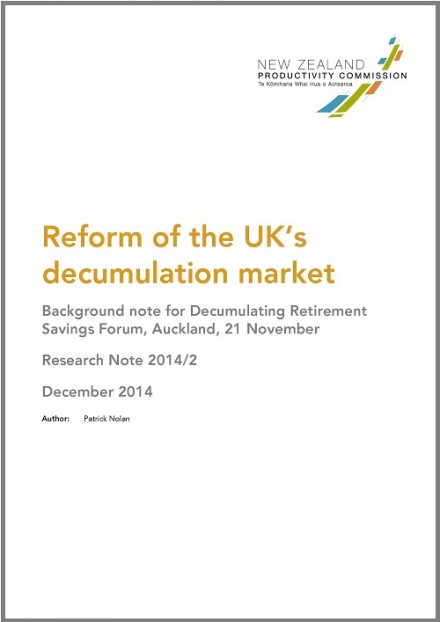Reform of the UK’s decumulation market

21 January 2015
This research note provides background material for the forum on “Decumulating retirement savings: making the options work” held by the Retirement Policy and Research Centre at the University of Auckland on 21 November 2014.
This research note focusses on the operation and role of the decumulation market in the context of an ageing population. This market includes financial products and activities which help people convert assets that have been built up earlier in life into incomes at and throughout retirement. This can include annuities, income drawdown and home equity release. This market can also include products which help manage costs in later life, such as long-term care insurance.
Interventions into retirement income systems pursue a range of objectives. Two prominent objectives are to prevent poverty or to replace incomes from working lives. New Zealand Superannuation is relatively successful at addressing pensioner poverty but is less effective at replacing income from work (particularly for pensioners who were higher earners in their working lives). One goal of KiwiSaver is to help close this gap but the effectiveness of this policy will be reduced unless there is a properly functioning decumulation market.
A number of overseas reviews have highlighted the need to improve choice and competition in the decumulation market. The interim report of Australia’s Financial System Inquiry (the Murray Review) noted the limited range of financial products available at and during retirement in that country. Earlier this year the United Kingdom’s Financial Conduct Authority announced revised terms of reference for a retirement income market study, following their previous thematic review of annuities.
The growing importance of the decumulation market reflects demographic changes which are altering the population’s risk profile. Not only will a greater share of the population be older but people can expect to live for longer. Based on current policy settings many people can expect to spend as long in retirement (or, more correctly, being above state pension age) as they spent paying off their mortgage. However, unlike a mortgage, when it comes to decumumulation people will have fewer opportunities (if any) to make up for poor decisions. Retirees will increasingly need to have a clear understanding of several types of risk – including longevity risk, inflation and interest rate risk, stock market risk and income shocks.
Managing the changing population risk profile requires a mixed model approach. Mixed model systems provide a number of benefits.
- They can reduce pressure on public systems and so mean programmes are more affordable (sustainable) in the long run.
- They can also increase the range of tools available for smoothing income over the lifecycle, pooling risk and converting illiquid assets into income.
However, internationally markets for products such as annuities, long-term care insurance and home equity release do not appear to be meeting their potential. One market where these products are relatively advanced (although perhaps still below potential) is the United Kingdom. The Coalition Government has, however, recently introduced reforms that are having a major effect on these markets.
Following earlier efforts to liberalise the United Kingdom’s annuity market the 2014 Budget included new tax pension rules that removed the effective requirement to buy an annuity. This has significantly reduced the incentive for purchasing an annuity. Given the newness of these reforms their final impact is still unclear. However, annuity sales are likely to be permanently and significantly reduced. The Prudential Regulation Authority is assessing the impact of these changes as they may give rise to a fresh set of prudential regulatory issues.
Greater emphasis is instead being placed on guidance. Every individual with defined contribution pension savings will have a right to free and impartial guidance at retirement. This will not recommend specific products or providers. The Financial Conduct Authority will have responsibility for setting guidance on and monitoring compliance with these standards. Improved guidance could potentially strengthen the market for products at retirement, particularly if guidance can address barriers related to a lack of consumer demand. However, supply-side barriers to expanding the market for decumulation products remain.
Recommendations on improving customer guidance were also a feature of the Dilnot reforms to the funding of long-term care. As well as guidance, these reforms included a measure (a lifetime cap on the cost of care) designed to remove the tail end risk and to, in turn, encourage a supply-side response. However, there is a view that even with such a cap there is unlikely to be a full market for products to fund the cost of care.
While differences in context mean there are limits in the ability to draw lessons from reforms in the United Kingdom for New Zealand, several factors suggest that drawing lessons could still nonetheless be a valuable exercise. These factors include an increasing role of capital in retirement incomes in New Zealand, a gap in income replacement for middle to higher earners and increasing longevity (future demand for decumulation products).
As noted above, these reforms highlighted the importance of guidance. This guidance has explicitly stopped short of recommending specific products or providers. Debates have also recognised the importance of starting well before retirement and not seeing retirement as a one-off event. Guidance is not only needed when making the initial decision on whether to, for example, take an annuity or not but also as people consider their finances throughout retirement.
This highlights the importance of a certain and stable policy environment. Decisions regarding savings and the purchase of private income support policies are by their nature long-term decisions. The more uncertain the decision making environment, the harder it will be for people to make the decisions that are in their longer term interests. And better informed customers can support product innovation too. As the Association of British Insurers has noted, whether and how people plan ahead is one thing that providers have in mind when committing capital for product development.
Publications
Filter publications by topic.
23 February 2024
20 February 2024
20 February 2024
20 February 2024
20 February 2024
13 February 2024
31 January 2024
14 November 2023
31 October 2023
17 October 2023
31 July 2023
3 July 2023
30 June 2023
30 June 2023
20 June 2023
1 May 2023
30 March 2023
28 February 2023
28 February 2023
27 February 2023
27 February 2023
20 February 2023
23 December 2022
21 December 2022
15 November 2022
29 September 2022
1 September 2022
18 July 2022
30 June 2022
9 June 2022
31 May 2022
28 May 2022
28 May 2022
1 April 2022
15 December 2021
1 December 2021
14 November 2021
8 November 2021
8 November 2021
8 November 2021
8 November 2021
27 September 2021
1 September 2021
19 July 2021
1 July 2021
27 May 2021
21 April 2021
21 April 2021
20 April 2021
20 April 2021
1 April 2021
25 February 2021
14 December 2020
4 December 2020
30 November 2020
4 September 2020
31 August 2020
1 August 2020
30 June 2020
30 June 2020
29 April 2020
28 April 2020
18 March 2020
9 March 2020
19 February 2020
31 January 2020
22 January 2020
20 December 2019
16 December 2019
1 December 2019
1 December 2019
30 November 2019
1 November 2019
1 November 2019
16 October 2019
1 September 2019
16 August 2019
1 July 2019
7 June 2019
1 June 2019
1 June 2019
16 May 2019
15 May 2019
1 March 2019
14 February 2019
1 February 2019
1 February 2019
24 December 2018
14 November 2018
6 November 2018
1 November 2018
1 October 2018
1 September 2018
31 August 2018
1 August 2018
14 June 2018
27 April 2018
20 March 2018
22 February 2018
15 December 2017
1 December 2017
1 December 2017
23 November 2017
23 November 2017
1 November 2017
1 November 2017
1 November 2017
29 September 2017
1 September 2017
1 August 2017
1 July 2017
1 July 2017
1 June 2017
21 March 2017
28 February 2017
20 February 2017
20 January 2017
16 December 2016
28 November 2016
25 November 2016
17 November 2016
27 September 2016
1 July 2016
27 April 2016
1 February 2016
12 January 2016
1 December 2015
1 December 2015
1 December 2015
1 December 2015
21 October 2015
15 September 2015
15 September 2015
15 September 2015
15 September 2015
15 September 2015
15 September 2015
15 September 2015
29 June 2015
29 May 2015
29 May 2015
1 May 2015
1 April 2015
5 February 2015
21 January 2015
1 November 2014
1 October 2014
1 October 2014
16 July 2014
1 July 2014
5 June 2014
5 June 2014
1 March 2014
1 March 2014
1 February 2014
19 December 2013
10 December 2013
20 September 2013
1 August 2013
1 August 2013
16 July 2013
13 May 2013
1 December 2012
30 November 2012
30 November 2012
30 November 2012
30 November 2012
30 November 2012
30 November 2012
30 November 2012
30 November 2012
1 May 2012
24 April 2012
30 March 2012





















































































































































































